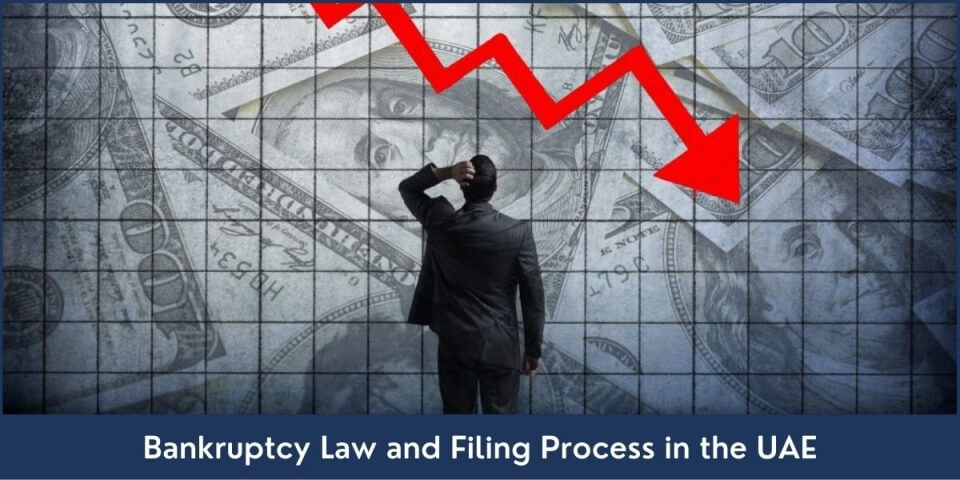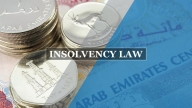المدونة القانونية
Filing for Bankruptcy and Insolvency in the UAE: What You Need to Know

In this guide, we break down the essentials of the UAE’s bankruptcy laws, focusing on the steps for filing, achieving successful liquidation, and the remedies available to both companies and individuals. This information could be your first step towards securing a brighter financial future while protecting your interests under UAE law.
UAE Bankruptcy Laws: An Overview
Several laws govern bankruptcy and insolvency in the UAE, providing a clear legal pathway for financial restructuring or liquidation:
1. Federal Decree-Law No. 51 of 2023: This law modernizes the bankruptcy process to make it more efficient, transparent, and creditor-friendly. It also emphasizes restructuring to keep businesses afloat before resorting to liquidation.
2. Federal Decree-Law No. 19 of 2019: The cornerstone of the UAE’s insolvency regime, this law lays out protections for debtors from legal action while pursuing a restructuring plan and encourages amicable settlements.
3. Federal Decree-Law No. 04 of 2020: Targeted at SMEs, this law simplifies insolvency proceedings, aiming to support small business owners through financial hardships with less complexity.
4. Federal Decree-Law No. 16 of 2021: This law strengthens the overall framework by ensuring greater transparency and fairness, along with penalties for fraudulent bankruptcy filings.
These laws are designed to stabilize the market and offer relief to debtors while safeguarding creditor rights.
Steps to Filing for Bankruptcy or Insolvency in the UAE
Here’s a basic roadmap to follow if you or your company are considering filing for bankruptcy:
1. Evaluate Your Financial Situation: A detailed assessment of assets, liabilities, and cash flow is critical. It helps determine whether restructuring is a possibility or if liquidation is the only viable option.
2. Prepare Your Application: File an insolvency or bankruptcy petition with the competent court. Your application should include a comprehensive financial statement, a list of debts, and proof of any negotiations with creditors.
3. Court Involvement and Expert Appointment: The court may appoint an insolvency expert to review your financial situation. The expert will prepare a report for the court, recommending either a restructuring plan or liquidation.
4. Restructuring Plan Approval: If the report supports restructuring, you’ll need to present a detailed plan to your creditors. Approval from the majority of creditors is required for the plan to move forward.
5. Liquidation Process: If restructuring is not feasible, liquidation becomes the next step. This involves selling off assets to pay creditors, overseen by a court-appointed liquidator.
6. Judicial Oversight: Throughout the process, the court ensures all actions are legal and transparent, protecting the interests of both debtors and creditors.
How to Ensure a Successful Liquidation
For businesses where restructuring isn’t an option, a successful liquidation requires careful planning and compliance. Here are some important factors:
1. Full Transparency: Complete disclosure of all assets and liabilities is crucial. Any attempt to hide or misrepresent information can result in severe penalties.
2. Licensed Liquidator: The court will appoint a licensed liquidator to manage the asset sale and distribution of proceeds. This professional ensures the process adheres to legal standards.
3. Creditors’ Claims Management: The UAE laws prioritize creditors, starting with secured creditors, followed by employees’ claims, and then the government. Clear communication with creditors can smooth the process.
4. Final Reporting and Court Approval: Once the liquidator has settled as many debts as possible, a final report is submitted to the court. The court then issues a decree to officially close the business.
What Happens After Liquidation?
Once liquidation is approved and completed, the company is dissolved and ceases to exist as a legal entity. Its obligations are considered fulfilled to the best extent possible. However, former directors may still have responsibilities, such as addressing any unresolved regulatory or legal matters.
For individuals, filing for insolvency can have long-term implications, such as restrictions on certain business activities, but it can also offer a fresh start, especially if debts are discharged.
Remedies Available for Individuals and Companies Post-Bankruptcy
The UAE legal framework offers several remedies to help individuals and companies regain financial stability after filing for bankruptcy:
1. Debt Restructuring and Rescheduling: Courts may approve a debt repayment schedule that is manageable, allowing you to pay off obligations over time. This can prevent the liquidation of key assets.
2. Debt Relief for Individuals: In some cases, courts may discharge debts, offering individuals a chance to rebuild their financial lives. This is particularly helpful for those facing overwhelming personal debt.
3. Asset Protection: The law ensures that essential assets remain protected, especially for individuals, to support basic living needs.
4. Future Business Opportunities: Bankruptcy is not the end of the road. With the right strategy and compliance, individuals and entrepreneurs can engage in new business activities and rebuild their reputations.
Impact on Credit Standing and Business Reputation
One of the biggest concerns for companies and individuals is the impact of bankruptcy on their credit standing and reputation. While bankruptcy does affect both, the long-term benefits of financial stability often outweigh the short-term drawbacks. The UAE legal system offers avenues for financial rehabilitation, allowing you to eventually rebuild your business or personal creditworthiness.
Conclusion
Filing for bankruptcy or insolvency is a serious decision that requires careful consideration and the right legal advice. The UAE’s legal system provides a structured and transparent process, whether you're looking to restructure your debts or liquidate your business. As an experienced lawyer based in Dubai, I can guide you through each step, ensuring compliance with all legal requirements and helping you achieve the best possible outcome.
If you need expert legal advice or want to discuss your case in more detail, feel free to contact me. Take the first step towards financial recovery today—let’s work together to protect your interests and secure your future.
Written by
Suhail Rana | Ibrahim Al Banna Advocates & Legal Consultants

هذا المنشور لعرض المعلومات العامة فقط، ولا يهدف لتقديم استشارة قانونية شاملة أو أي نوع آخر من الاستشارات.
لا تتحمل شركة ليجال أدفايس ميدل إيست والمساهمون مسؤولية أي خسائر قد تنجم عن الاعتماد على المعلومات المذكورة في هذا المنشور. هذا المنشور يهدف فقط إلى الإشارة إلى المسائل القانونية التي تحتاج إلى طلب الاستشارة بشأنها.
لا بد من الحصول على استشارة قانونية شاملة في الوقت المناسب من خلال محامٍ كفء عند التعامل مع مواقف معينة.





